Podcast
Questions and Answers
What is emotion regulation?
What is emotion regulation?
The process of influencing which emotions one has, when one has them, and how one experiences and expresses these emotions.
Name one strategy of emotion regulation and briefly describe it.
Name one strategy of emotion regulation and briefly describe it.
Cognitive reappraisal, which involves changing the interpretation of a situation to alter its emotional impact.
How does emotion regulation influence mental health?
How does emotion regulation influence mental health?
Effective regulation is linked to positive outcomes such as better stress management, while poor regulation is associated with anxiety and depression.
What does the James-Lange Theory propose about emotions?
What does the James-Lange Theory propose about emotions?
What is the main idea of the Cannon-Bard Theory?
What is the main idea of the Cannon-Bard Theory?
Explain the Schachter-Singer Two-Factor Theory in one sentence.
Explain the Schachter-Singer Two-Factor Theory in one sentence.
What is the facial feedback hypothesis?
What is the facial feedback hypothesis?
How does appraisal theory define emotions?
How does appraisal theory define emotions?
What does the Constructed Emotion Theory suggest?
What does the Constructed Emotion Theory suggest?
Why is emotion regulation important in social interactions?
Why is emotion regulation important in social interactions?
Flashcards are hidden until you start studying
Study Notes
Emotions
Emotion Regulation
- Definition: The process of influencing which emotions one has, when one has them, and how one experiences and expresses these emotions.
- Strategies:
- Cognitive Reappraisal: Changing the interpretation of a situation to alter emotional impact.
- Expressive Suppression: Inhibiting the outward expression of emotions.
- Problem-Solving: Actively addressing the source of distress.
- Mindfulness: Being aware of and accepting emotions without judgment.
- Importance:
- Affects mental health and well-being.
- Influences interpersonal relationships and social functioning.
- Outcomes:
- Effective regulation linked to positive outcomes (e.g., better stress management).
- Poor regulation associated with anxiety, depression, and behavioral issues.
Theories Of Emotion
- James-Lange Theory:
- Emotion is the result of physiological reactions to events (e.g., we feel sad because we cry).
- Cannon-Bard Theory:
- Emotion and physiological reactions occur simultaneously but independently (e.g., feeling fear and a racing heart at the same time).
- Schachter-Singer Two-Factor Theory:
- Emotions arise from a combination of physiological arousal and cognitive appraisal (labeling the arousal).
- Facial Feedback Hypothesis:
- Facial expressions can influence emotional experiences (e.g., smiling can make one feel happier).
- Appraisal Theory:
- Emotions are determined by how we appraise or interpret a stimulus (e.g., threat vs. challenge).
- Constructed Emotion Theory:
- Emotions are constructed from basic psychological processes and influenced by individual experiences and cultural context.
Key Points
- Emotion regulation is vital for mental health and social interactions.
- Various theories provide frameworks for understanding how emotions are generated and experienced.
- Recognizing the interplay between physiological responses and cognitive interpretations is crucial for grasping emotional experiences.
Emotion Regulation
- Influences emotional experiences, expressions, and timing of emotions.
- Cognitive Reappraisal: Involves reinterpreting a situation to change its emotional impact.
- Expressive Suppression: Involves consciously inhibiting emotional expressions.
- Problem-Solving: Engaging directly with stressors to reduce emotional distress.
- Mindfulness: Cultivates acceptance and awareness of one’s emotional state without judgment.
- Emotion regulation is crucial for promoting mental health and enhancing interpersonal relationships.
- Effective emotion regulation is associated with positive mental outcomes, like improved stress management.
- Poor emotion regulation can lead to mental health issues, including anxiety and depression.
Theories of Emotion
- James-Lange Theory: Proposes that physiological responses precede and lead to emotional experiences.
- Cannon-Bard Theory: Suggests that emotion and physiological reactions occur together and independently.
- Schachter-Singer Two-Factor Theory: Emotions are formed through physiological arousal combined with cognitive labeling of that arousal.
- Facial Feedback Hypothesis: Indicates that facial expressions can affect emotional experiences (e.g., smiling can enhance feelings of happiness).
- Appraisal Theory: Emphasizes that emotions depend on personal interpretations of stimuli, distinguishing between threats and challenges.
- Constructed Emotion Theory: Asserts that emotions arise from basic psychological processes shaped by individual experiences and cultural context.
Key Points
- Mastery of emotion regulation is essential for mental wellness and effective social interaction.
- Various theories explain the origins and experiences of emotions, underscoring the significance of physiological and cognitive factors.
- Understanding how physiological responses and cognitive appraisals work together is vital for comprehending emotional experiences.
Studying That Suits You
Use AI to generate personalized quizzes and flashcards to suit your learning preferences.




